Have you ever had a moment where you’ve just had enough? One where you think you just cannot stand by one more minute without saying, “No more! This is not okay!”?
I had that moment on Saturday.
I was attending the annual conference of The TLC Foundation for Body-Focused Repetitive Behaviors in St. Louis, heading to another wonderfully information-packed session, when I received this text from my mom:
“Just sent you an email response I sent to the editor of [major women’s magazine] regarding finding the phrase “be a little OCD” in the latest issue. Here it is, in bold print, no less.”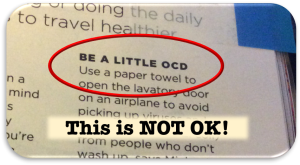
I stopped dead in my tracks.
“You’ve GOT to be kidding me,” I said out loud, to no one in particular. In utter disbelief that a well-respected, mainstream magazine could be so uninformed, I stared at the photo of the glossy page, mouth agape.
Beginning to walk to my session again, I said aloud, not caring that I was still talking to myself, “That’s it. I’ve had it. I’m writing that blog post that I’ve been meaning to write for more than a year. Because I can’t stand seeing these uneducated phrases about OCD popping up everywhere anymore.”
By the way, I’m not going to say which magazine put “Be a little OCD” in print because this is not about shaming them; that would be doing the very thing that I’m advocating against. Instead, this is about education. This is about keeping a promise to myself as an advocate for people like me who have OCD, a promise whose fulfillment is clearly long overdue.
What OCD Means
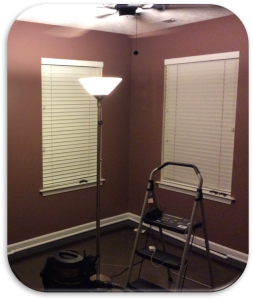 I recently painted a few rooms in my house. I am, if I may say so, an excellent house painter. I do not use painter’s tape where the wall meets the ceiling or baseboards. I don’t need to. I did house-painting as a summer job in high school, so I have good skills and a steady hand, and I’m quick to mop up any drips of paint where paint isn’t supposed to go. So I can skip all of the taping prep work, and the final result looks pretty darn good.
I recently painted a few rooms in my house. I am, if I may say so, an excellent house painter. I do not use painter’s tape where the wall meets the ceiling or baseboards. I don’t need to. I did house-painting as a summer job in high school, so I have good skills and a steady hand, and I’m quick to mop up any drips of paint where paint isn’t supposed to go. So I can skip all of the taping prep work, and the final result looks pretty darn good.
Some people who read this might describe my house painting abilities by saying, “You’re so OCD” about house painting. The people who would say this, however, do not know what they are saying. They think they are saying, “You’re so meticulous, fastidious, detail-oriented, careful, painstaking, etc…” But they are not.
Because having OCD does not mean being meticulous. Having OCD, especially untreated OCD, means being tortured, in hell, miserable, terrified, paralyzed, agony-filled, pained, horrified, self-hating, ashamed, guilt-ridden, confused, and/or so despairingly haunted by frightening thoughts that at times people suffering with the disorder can be suicidal.
I am confident that no one would ever use any of those words to describe painting skills, mine or anyone else’s. Because that would make no sense. Which is why I believe if we educate people about OCD, they will slowly but surely wipe “I’m so OCD” and “Be a little OCD” and all phrases remotely like these out of their vocabulary.
OCD is NOT a Joke
OCD is not an adjective to describe people who are neat and tidy. It is the tenth most disabling condition in the world (Murray and Lopez 1996). The majority of people who have it also have depression (Crino and Andrews 1996), the world’s most disabling condition (Murray and Lopez 1996). So people with OCD are typically juggling two of the top disabling conditions on this planet. But here’s the catch: if you are around most people who have untreated OCD, it’s unlikely you will know they are suffering—we are that good at hiding what’s going on in our horror-filled minds.
 And maybe that’s the problem. Maybe those of us with OCD should start sharing the intrusive thoughts that can plague us on a daily basis, sometimes for hours at a time, or if the OCD is untreated, days, weeks, or even months at a time. This transparency might help people understand what the seemingly innocuous phrase “I’m so OCD” is trivializing, thoughts such as:
And maybe that’s the problem. Maybe those of us with OCD should start sharing the intrusive thoughts that can plague us on a daily basis, sometimes for hours at a time, or if the OCD is untreated, days, weeks, or even months at a time. This transparency might help people understand what the seemingly innocuous phrase “I’m so OCD” is trivializing, thoughts such as:
“What if I want to have sex with my two-year old daughter?”
“What if I blasphemed the Holy Spirit and will be doomed to a life in hell?”
“What if I contaminated that mother and her child? What if they get sick and die all because of me and my carelessness?”
“What if I’m really a truly horrible, bad person who doesn’t deserve to live?”
Overly Sensitive? I Don’t Think So
Now, some people may read this post and say, “Oh, people with OCD, get over yourselves. Stop being so sensitive. No one saying ‘I’m so OCD’ means any harm.”
Therein lies the crux of the problem. They don’t mean any harm; they are just uninformed about OCD, but this flippant misuse of the name of a disorder IS causing harm to those who are actively suffering with the disorder.
 To the people who have OCD who see me in therapy, representatives of the 1-2% of the population who have the disorder over the course of their lifetimes (NIMH, 2017), it doesn’t matter that people don’t mean any harm when they say, “You’re so OCD” or “Be a little OCD.” Those comments, and others like them, just make them feel more ashamed that they can’t seem to get their minds to stop focusing on all these horrific things, because they should be able to, because after all, it’s just OCD, something so trivial it’s used as an adjective not only in common parlance by people all around them but also by leading corporations and major media outlets every single day.
To the people who have OCD who see me in therapy, representatives of the 1-2% of the population who have the disorder over the course of their lifetimes (NIMH, 2017), it doesn’t matter that people don’t mean any harm when they say, “You’re so OCD” or “Be a little OCD.” Those comments, and others like them, just make them feel more ashamed that they can’t seem to get their minds to stop focusing on all these horrific things, because they should be able to, because after all, it’s just OCD, something so trivial it’s used as an adjective not only in common parlance by people all around them but also by leading corporations and major media outlets every single day.
My clients, men, women, and children of all ethnicities and ages, often spend one or more of their sessions with me crying, sometimes uncontrollably, because they think they are losing their minds. They don’t understand what’s happening to them, and they feel like no one else understands either, and they certainly aren’t going to tell anyone other than me the awful thoughts they often have, for fear of being locked away for the rest of their lives. And sometimes they are even hesitant to tell me, especially people who are afraid they are closet pedophiles, for fear that as a mandated child abuse reporter I’m going to have to call the authorities and have them hauled away. (Which I have never done and would never do for someone who has pedophile-themed OCD). These people have lived lives of absolute horror, as it takes on average 14-17 years from the time of symptom onset (IOCDF, 2017) for people with OCD to get evidence-based treatment, exposure and response prevention therapy (ERP), the only therapy we know of that can end OCD’s reign of terror and allow people to start rebuilding their lives—the happy lives they deserve to live.
So it doesn’t matter that people do not intend to cause harm by saying, “I’m so OCD.” Harm is, in so many cases, the unfortunate result nonetheless.
There Is Hope
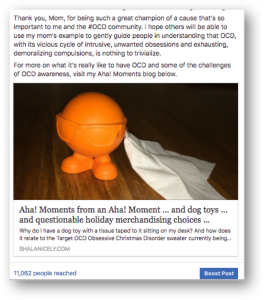 Over the past few years, my mother has become a staunch advocate for the elimination of the phrase “I’m so OCD.” She is unyielding in her drive to let everyone who misuses that term know, in a nice way, that they are trivializing the suffering of others. In fact, a post that she made on Facebook in response to an “I’m so OCD” comment that I then reposted was shared nearly 100 times, gaining more than 10,000 views in the course of a few days. These stats are heartening, in that they show that my mom and I are not alone in our quest to educate people about the damage that can be done with three, or in the case of the magazine article, four little words.
Over the past few years, my mother has become a staunch advocate for the elimination of the phrase “I’m so OCD.” She is unyielding in her drive to let everyone who misuses that term know, in a nice way, that they are trivializing the suffering of others. In fact, a post that she made on Facebook in response to an “I’m so OCD” comment that I then reposted was shared nearly 100 times, gaining more than 10,000 views in the course of a few days. These stats are heartening, in that they show that my mom and I are not alone in our quest to educate people about the damage that can be done with three, or in the case of the magazine article, four little words.
If you have OCD or love someone with OCD, please join my mother and me in this grassroots campaign to educate the world on the damage being done by “I’m so OCD” and comments like it. Share this blog post. Talk about the issue with others in your life. Gently help people understand that what they want to say is “you’re so meticulous/ neat/ detail-oriented/ etc…” If each of us acts in small ways to help raise awareness of the damage “I’m so OCD” can cause, if each of us follows the sage advice, often attributed to Gandhi, to “be the change you want to see in this world,” we can together make a big difference in the lives of people suffering with OCD.
#LetsStopSayingI’mSoOCD because #I’mSoOCDTrivializesObsessiveCompulsiveDisorder. Those of us who know the horror that is OCD will be forever grateful.
References
Crino, R.D., & Andrews, G. 1996. Obsessive-compulsive disorder and Axis I comorbidity. Journal of Anxiety Disorders. 10(1): 37-46.
International OCD Foundation, 2017.
Murray, C. J. L., & Lopez A. D. 1996. The Global Burden of Disease. Cambridge, MA: Harvard University Press.

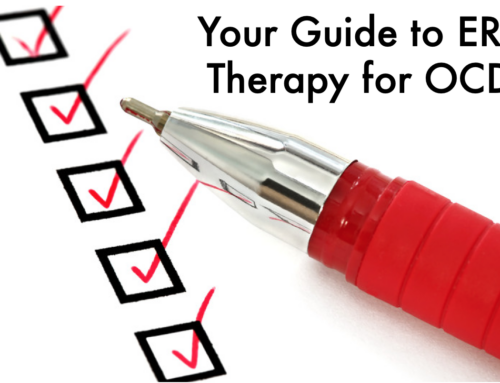
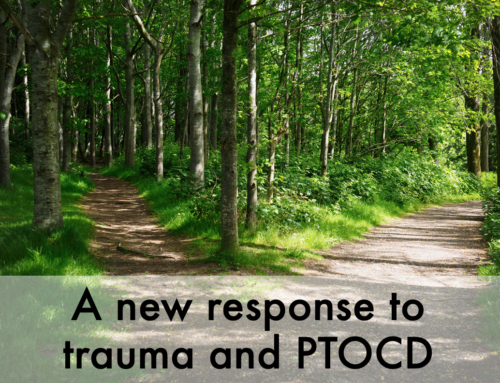
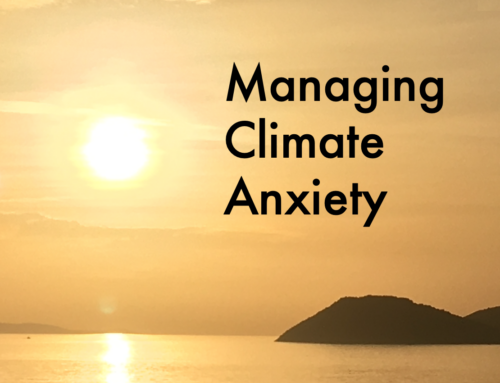

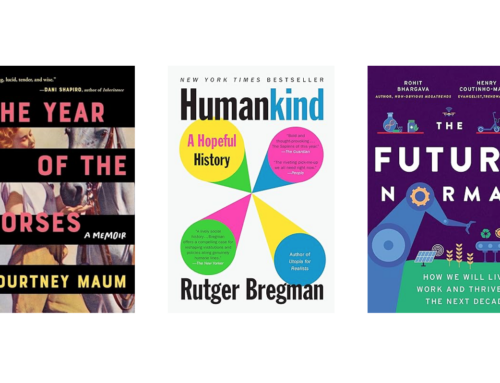
[…] If we could label thoughts as “OCD” thoughts, then everyone would have OCD because everyone sometimes has intrusive thoughts. And as all of us with OCD know, everyone does not have “a touch of OCD” (for more on my thoughts on “I’m so OCD…” please see this Aha! Moment.) […]